Unit No: 05 Management Accounting
Added on 2022-01-18
47 Pages17542 Words42 Views
Unit No: 05
Unit Name: Management Accounting
Keerthanambari Gopinath
Pearson BTEC Level 5 HND in Business
Regd No:
Unit Name: Management Accounting
Keerthanambari Gopinath
Pearson BTEC Level 5 HND in Business
Regd No:
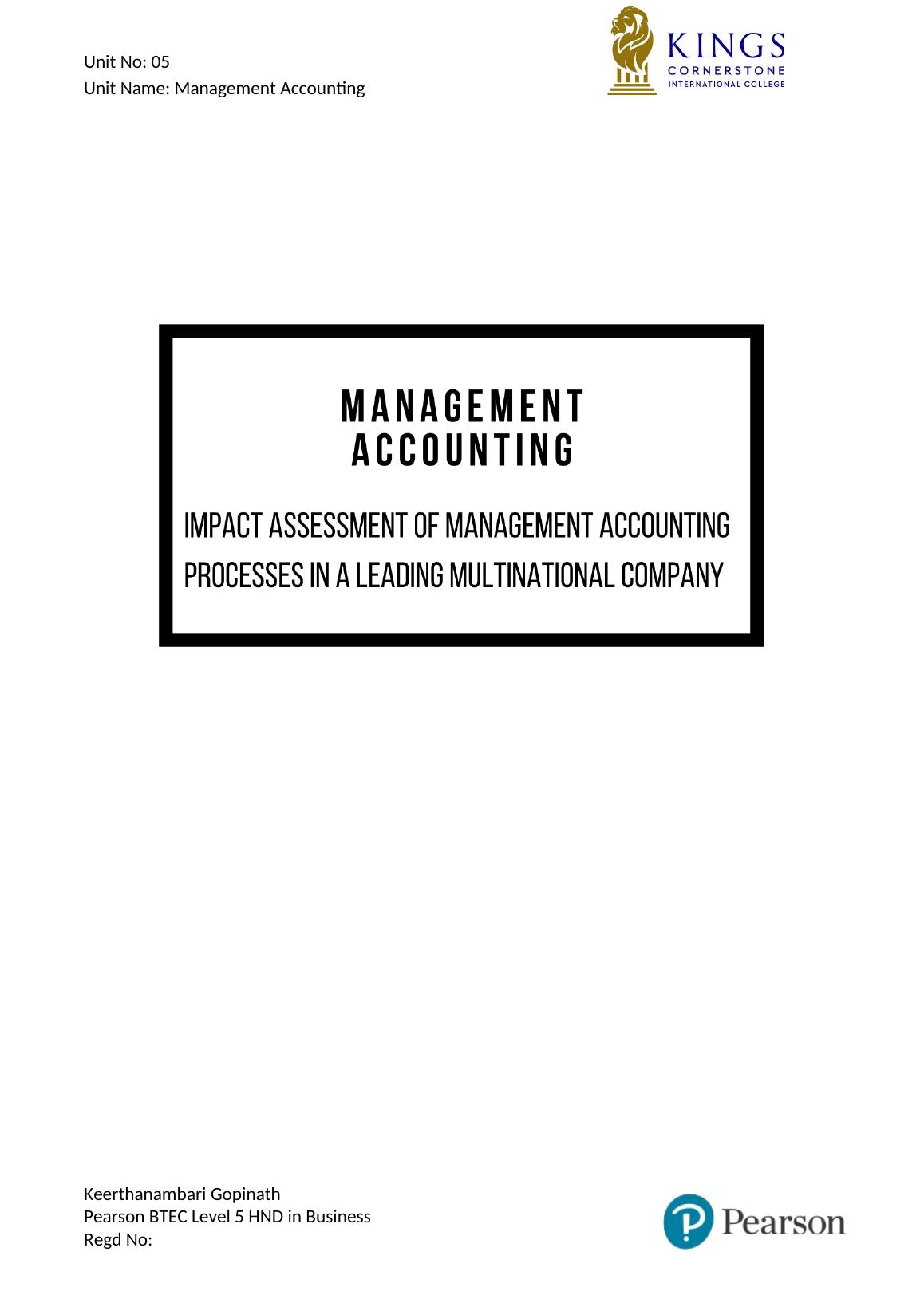
Unit No: 05
Unit Name: Management Accounting
Contents
Management Accounting.......................................................................................................................3
Internal and external users:...............................................................................................................5
Management Accounting System..........................................................................................................7
Principles of Management Accounting:.............................................................................................7
Types of Management Accounting Systems:.....................................................................................8
Management of Accounting Reporting................................................................................................12
Tata Motor Company...........................................................................................................................14
Benefits of Management Accounting Systems in Tata Motors:......................................................14
Conclusion........................................................................................................................................19
Integration of Management Accounting Systems and Reports in Tata motors..................................19
Cost Management............................................................................................................................19
Quality management in Tata............................................................................................................20
Integrated Accounting System.........................................................................................................20
Advantages of an integrated accounting system:............................................................................20
Conclusion........................................................................................................................................21
Budgetary Control................................................................................................................................22
Use and application of planning tools to prepare budgets and forecasts in Tata:..............................29
Types of budgets and their application............................................................................................29
behavioural Implication of budgeting..............................................................................................31
Pricing strategy.................................................................................................................................31
Conclusion of Strategic planning of Tata Motors.............................................................................33
SWOT analysis..................................................................................................................................33
PEST analysis....................................................................................................................................35
The response of management accounting system to financial problems:..........................................36
Management accounting skill set....................................................................................................39
Characteristics.................................................................................................................................39
Conclusion........................................................................................................................................40
Response of financial problems impact on sustainable success through M.A....................................41
Sustainable success..........................................................................................................................41
Management accounting leading to sustainable success................................................................41
Conclusion........................................................................................................................................42
Sustainable success through solving of financial problems with planning tools.................................42
Bibliography.........................................................................................................................................43
Keerthanambari Gopinath
Pearson BTEC Level 5 HND in Business
Regd No:
Unit Name: Management Accounting
Contents
Management Accounting.......................................................................................................................3
Internal and external users:...............................................................................................................5
Management Accounting System..........................................................................................................7
Principles of Management Accounting:.............................................................................................7
Types of Management Accounting Systems:.....................................................................................8
Management of Accounting Reporting................................................................................................12
Tata Motor Company...........................................................................................................................14
Benefits of Management Accounting Systems in Tata Motors:......................................................14
Conclusion........................................................................................................................................19
Integration of Management Accounting Systems and Reports in Tata motors..................................19
Cost Management............................................................................................................................19
Quality management in Tata............................................................................................................20
Integrated Accounting System.........................................................................................................20
Advantages of an integrated accounting system:............................................................................20
Conclusion........................................................................................................................................21
Budgetary Control................................................................................................................................22
Use and application of planning tools to prepare budgets and forecasts in Tata:..............................29
Types of budgets and their application............................................................................................29
behavioural Implication of budgeting..............................................................................................31
Pricing strategy.................................................................................................................................31
Conclusion of Strategic planning of Tata Motors.............................................................................33
SWOT analysis..................................................................................................................................33
PEST analysis....................................................................................................................................35
The response of management accounting system to financial problems:..........................................36
Management accounting skill set....................................................................................................39
Characteristics.................................................................................................................................39
Conclusion........................................................................................................................................40
Response of financial problems impact on sustainable success through M.A....................................41
Sustainable success..........................................................................................................................41
Management accounting leading to sustainable success................................................................41
Conclusion........................................................................................................................................42
Sustainable success through solving of financial problems with planning tools.................................42
Bibliography.........................................................................................................................................43
Keerthanambari Gopinath
Pearson BTEC Level 5 HND in Business
Regd No:
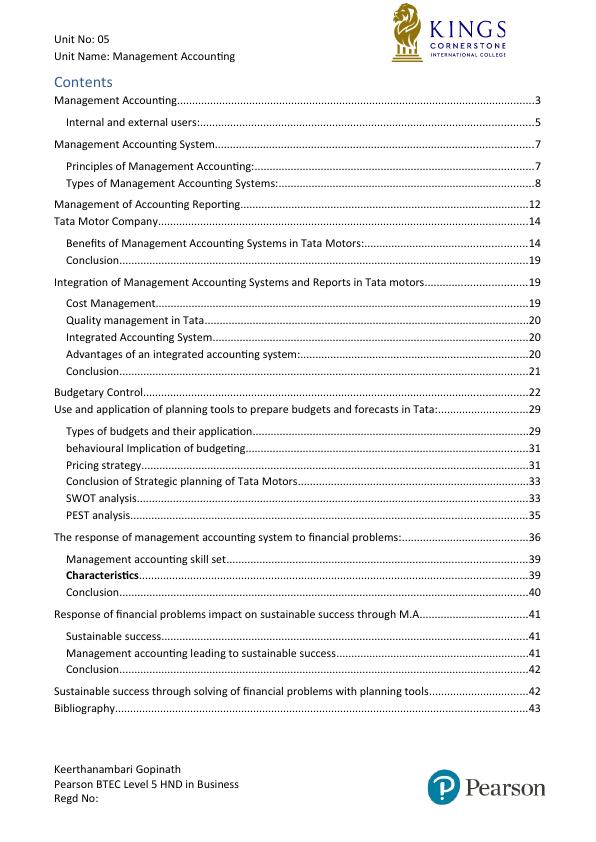
Unit No: 05
Unit Name: Management Accounting
Management Accounting
The practice of defining, evaluating, assessing, presenting, and communicating financial information
to managers to achieve the objectives of an organization is managerial accounting. It differs from
financial accounting because management accounting's intended aim is to assist the organization's
corporate users in making well-informed strategic decisions. Management Accounting according to
The Institute of Cost and Management Accountants, has been defined as:
“The application of professional knowledge and skill in the preparation of accounting information
in such a way as to assist management in the formulation of policies and the planning and
control of the operation of the undertakings.” (Cleartax, 2019)
The data gathered encompasses all accounting areas that advise business operations management
of the costs of goods or services purchased by the organisation. Management accountants use
budgets to calculate the operating strategy of the organisation. There are four main functions of
management accounting:
Planning
Planning is an essential feature in management accounting that is most efficiently carried out by
the budget preparation and forecasts. Forecasting is the process of predicting the projected
financial results and potential position of a company. Popular forms of forecasting include cash flow
projection, expected profit and loss estimate and balance sheet forecast. Forecasting is the building
block for evaluating the resource needs of a company that are quantified in budgets.
The budgets calculate the financial goals to be accomplished by the management of the company.
It helps to efficiently distribute the resources of a company between competing demands to
accomplish the financial objectives of a corporation. Budgets and predictions help companies cope
constructively with future challenges and prevent predictable delays in business resources.
Decision-making
Management accounting includes the development of financial information to decision-making
managers. Management accounting also includes assessing substitute methods and activities by
applying principles and techniques such as applicable costing, limiting factor analysis, investment
assessment techniques and analysis of the productivity of the client/product.
Monitoring and Control
Regulation of the management accounting system begins with the description of the parameters by
which success can be calculated, such as standard costs and budgets. Real outcomes are calculated
and any difference between goals and results is evaluated and appropriate action is taken where
required. Management accounting plays a crucial role in tracking and managing the expense and
Keerthanambari Gopinath
Pearson BTEC Level 5 HND in Business
Regd No:
Unit Name: Management Accounting
Management Accounting
The practice of defining, evaluating, assessing, presenting, and communicating financial information
to managers to achieve the objectives of an organization is managerial accounting. It differs from
financial accounting because management accounting's intended aim is to assist the organization's
corporate users in making well-informed strategic decisions. Management Accounting according to
The Institute of Cost and Management Accountants, has been defined as:
“The application of professional knowledge and skill in the preparation of accounting information
in such a way as to assist management in the formulation of policies and the planning and
control of the operation of the undertakings.” (Cleartax, 2019)
The data gathered encompasses all accounting areas that advise business operations management
of the costs of goods or services purchased by the organisation. Management accountants use
budgets to calculate the operating strategy of the organisation. There are four main functions of
management accounting:
Planning
Planning is an essential feature in management accounting that is most efficiently carried out by
the budget preparation and forecasts. Forecasting is the process of predicting the projected
financial results and potential position of a company. Popular forms of forecasting include cash flow
projection, expected profit and loss estimate and balance sheet forecast. Forecasting is the building
block for evaluating the resource needs of a company that are quantified in budgets.
The budgets calculate the financial goals to be accomplished by the management of the company.
It helps to efficiently distribute the resources of a company between competing demands to
accomplish the financial objectives of a corporation. Budgets and predictions help companies cope
constructively with future challenges and prevent predictable delays in business resources.
Decision-making
Management accounting includes the development of financial information to decision-making
managers. Management accounting also includes assessing substitute methods and activities by
applying principles and techniques such as applicable costing, limiting factor analysis, investment
assessment techniques and analysis of the productivity of the client/product.
Monitoring and Control
Regulation of the management accounting system begins with the description of the parameters by
which success can be calculated, such as standard costs and budgets. Real outcomes are calculated
and any difference between goals and results is evaluated and appropriate action is taken where
required. Management accounting plays a crucial role in tracking and managing the expense and
Keerthanambari Gopinath
Pearson BTEC Level 5 HND in Business
Regd No:
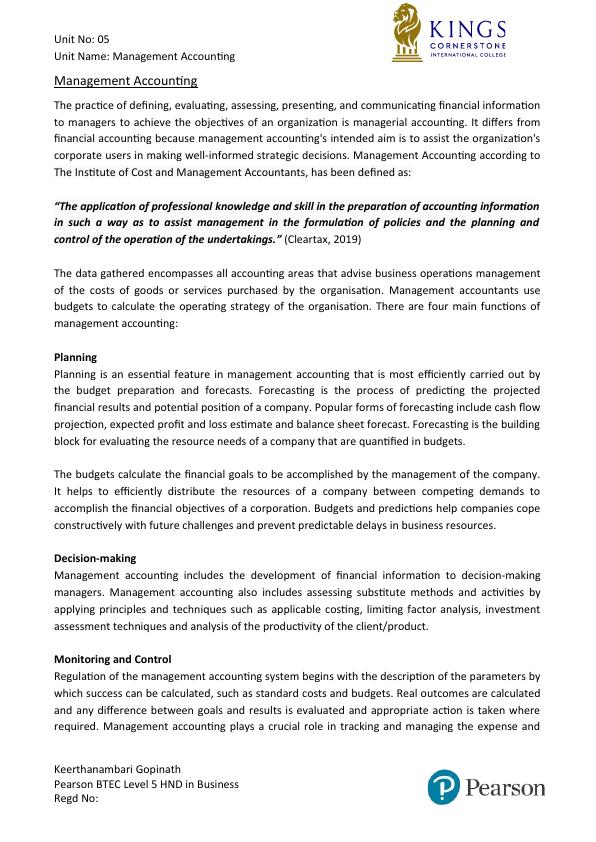
Unit No: 05
Unit Name: Management Accounting
performance of normal operations, as well as the activities and initiatives performed by the
organisation.
Accountability
Management accounting puts a great deal of focus on transparency by successful performance
assessment. By setting goals for core businesses as well as for divisions, it assists individual
managers in the assigning of responsibilities for the achievement of the organizational objectives.
Accountability is accomplished by evaluation of the performance of managers responsible for their
business divisions while taking back control of factors not under their influence and control.
(Google, 2020)
Management and Financial Accounting are similar yet vastly differentiated, while managerial
accounting focuses on giving a goal to provide managers with both qualitative and quantitative data
to help them make decisions and thus maximise profit. On the other hand, Financial accounting
highlights providing different stakeholders with an authentic and realistic view of the company's
financial status. The main differences include:
(WallStreetMojo, 2016)
The focus of the Organisation
Managerial accounting focuses on the components of the organisation. While the findings of
managerial accounting can be applied to the enterprise as a whole, finer specifics, such as
manufacturing performance, customer satisfaction, and marketing effectiveness, are most
Keerthanambari Gopinath
Pearson BTEC Level 5 HND in Business
Regd No:
Unit Name: Management Accounting
performance of normal operations, as well as the activities and initiatives performed by the
organisation.
Accountability
Management accounting puts a great deal of focus on transparency by successful performance
assessment. By setting goals for core businesses as well as for divisions, it assists individual
managers in the assigning of responsibilities for the achievement of the organizational objectives.
Accountability is accomplished by evaluation of the performance of managers responsible for their
business divisions while taking back control of factors not under their influence and control.
(Google, 2020)
Management and Financial Accounting are similar yet vastly differentiated, while managerial
accounting focuses on giving a goal to provide managers with both qualitative and quantitative data
to help them make decisions and thus maximise profit. On the other hand, Financial accounting
highlights providing different stakeholders with an authentic and realistic view of the company's
financial status. The main differences include:
(WallStreetMojo, 2016)
The focus of the Organisation
Managerial accounting focuses on the components of the organisation. While the findings of
managerial accounting can be applied to the enterprise as a whole, finer specifics, such as
manufacturing performance, customer satisfaction, and marketing effectiveness, are most
Keerthanambari Gopinath
Pearson BTEC Level 5 HND in Business
Regd No:
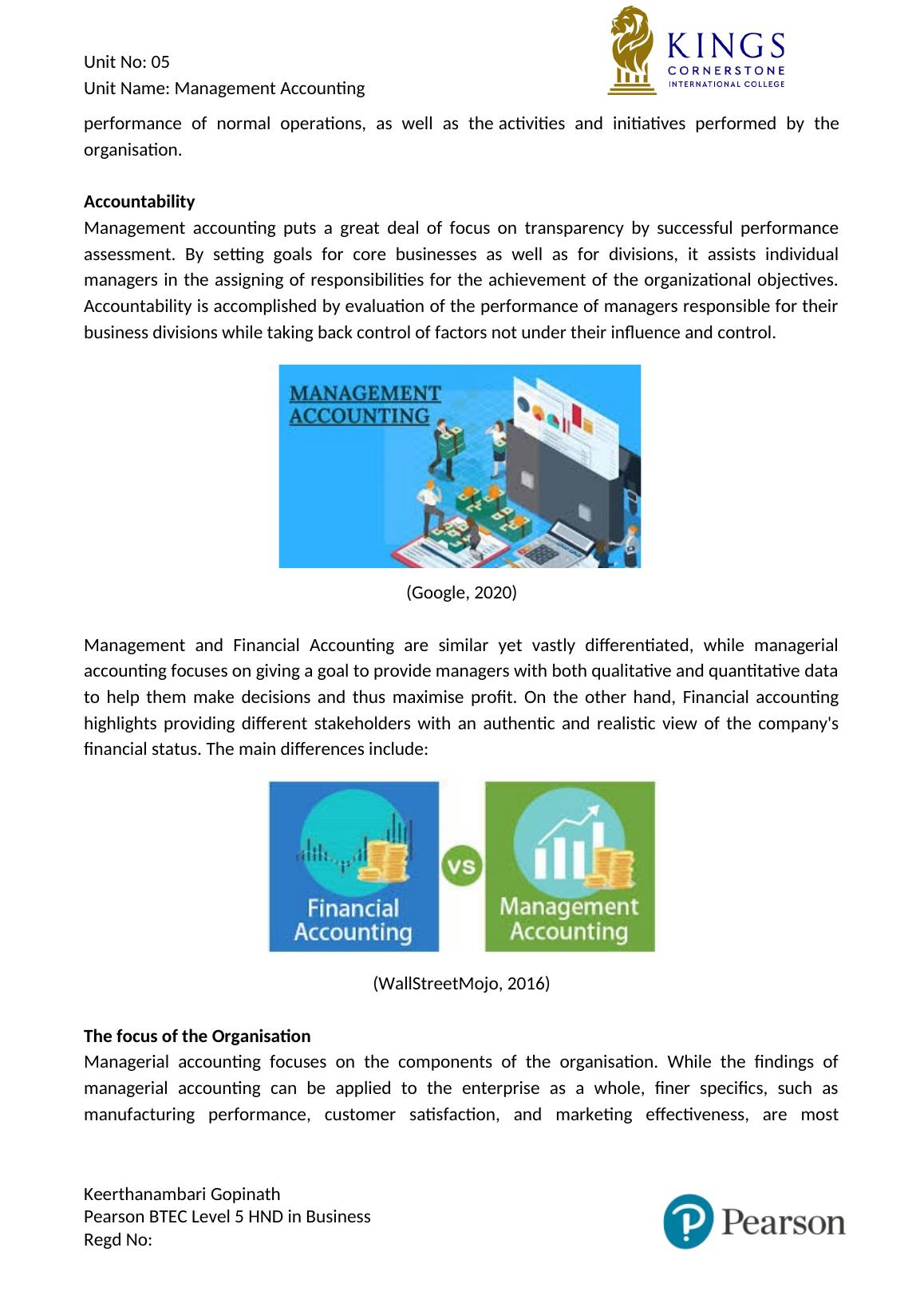
Unit No: 05
Unit Name: Management Accounting
frequently concerned. Financial accounting takes a broader approach and explores the financial
position of the whole corporation.
Estimation and facts
Estimating potential expenses, such as production, marketing, inventory, delivery, and R&D, is one
of the core functions of managerial accounting. It serves to get a perspective on what in a few days,
weeks, months, and years could happen. However, facts are dealt with through financial reports.
This method of accounting never uses assumptions because of the accuracy required to establish
financial statements for profit and tax purposes.
Reports
Reports generated by management accounting (e.g., operating reporting) are only transmitted
internally within the organisation to individuals. Public disclosure records (e.g. financial statements
and analyst records) are typically externally circulated to parties outside the company.
Standards
Managerial accounting doesn't have to meet with requirements when compiling data and
producing records. This is because the data is usually stored in-house and is not intended for
general use. On the other hand, financial accounting is tightly governed by a large range of simple,
intermediate, and complex accounting principles.
Assets
Organizations typically use managerial accounting to assess the market to determine whether an
asset is profitable. When, after two years on the manufacturing line, the organisation needs to
predict how much the same asset is worth, financial analysis is used to assess the condition.
Efficiency
The performance and efficacy of an organisation are stated by financial statements. Reports from
managerial accounting about what causes a problem and how to resolve the problems.
Timing
Financial statements are expected by the completion of the accounting year, while management
reports can be provided more regularly to give appropriate information to administrators from
which they can respond promptly.
Internal and external users:
Information presented through managerial accounting in an organisation is implemented by
shareholders. Different parties use this information, based on their needs, for various functions.
Therefore, a business company's accounting information system must be structured in such a
manner that reporting can be produced to accommodate the information needs of each
Keerthanambari Gopinath
Pearson BTEC Level 5 HND in Business
Regd No:
Unit Name: Management Accounting
frequently concerned. Financial accounting takes a broader approach and explores the financial
position of the whole corporation.
Estimation and facts
Estimating potential expenses, such as production, marketing, inventory, delivery, and R&D, is one
of the core functions of managerial accounting. It serves to get a perspective on what in a few days,
weeks, months, and years could happen. However, facts are dealt with through financial reports.
This method of accounting never uses assumptions because of the accuracy required to establish
financial statements for profit and tax purposes.
Reports
Reports generated by management accounting (e.g., operating reporting) are only transmitted
internally within the organisation to individuals. Public disclosure records (e.g. financial statements
and analyst records) are typically externally circulated to parties outside the company.
Standards
Managerial accounting doesn't have to meet with requirements when compiling data and
producing records. This is because the data is usually stored in-house and is not intended for
general use. On the other hand, financial accounting is tightly governed by a large range of simple,
intermediate, and complex accounting principles.
Assets
Organizations typically use managerial accounting to assess the market to determine whether an
asset is profitable. When, after two years on the manufacturing line, the organisation needs to
predict how much the same asset is worth, financial analysis is used to assess the condition.
Efficiency
The performance and efficacy of an organisation are stated by financial statements. Reports from
managerial accounting about what causes a problem and how to resolve the problems.
Timing
Financial statements are expected by the completion of the accounting year, while management
reports can be provided more regularly to give appropriate information to administrators from
which they can respond promptly.
Internal and external users:
Information presented through managerial accounting in an organisation is implemented by
shareholders. Different parties use this information, based on their needs, for various functions.
Therefore, a business company's accounting information system must be structured in such a
manner that reporting can be produced to accommodate the information needs of each
Keerthanambari Gopinath
Pearson BTEC Level 5 HND in Business
Regd No:
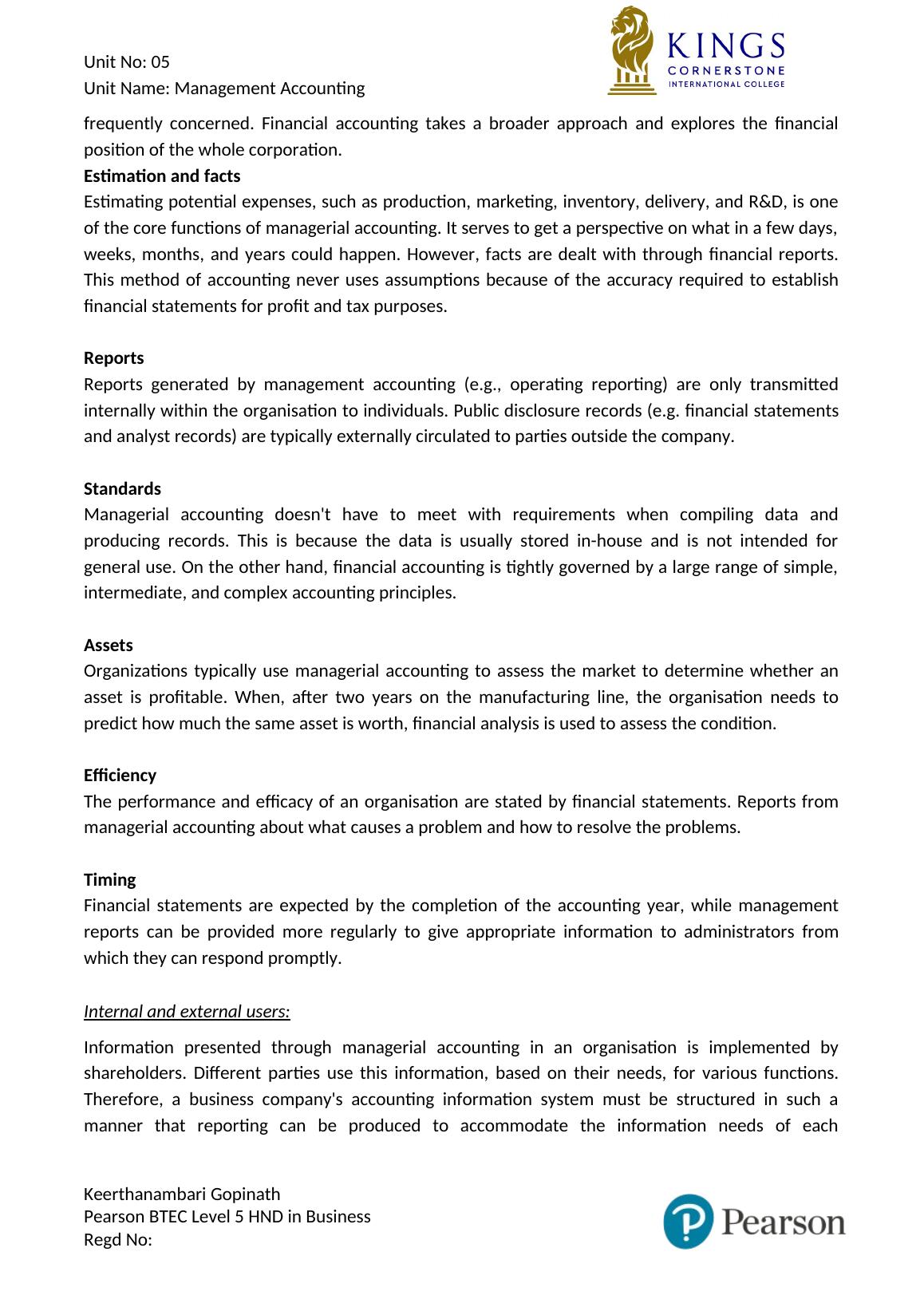
Unit No: 05
Unit Name: Management Accounting
stakeholder. There are typically types of primary users of the accounting information: (SlideShare,
2017)
(Google, 2018)
1. Internal users
Managers
Management uses accounting reports to analyse and evaluate the operating performance and
status of the company, to make crucial decisions and necessary measures to increase the revenue,
financial situation and profitability of firm performance. Setting rules and policies to meet
corporate goals is among the main management functions. Management uses knowledge created
by the organisation's economic and managerial accounting system for this purpose.
Executives
To initiate and manage companies, owners spend money with the primary goal of generating profit.
To understand what they have gained or incurred over a given period, they enable effective
financial records. They determine their strategic direction of business decisions based on this
knowledge. Owners often play the role of management in small enterprises, such as sole
proprietorship or partnership.
2. External users
Suppliers
Suppliers are large corporations or businesses who typically supply goods or materials on loan to
other firms. They use accounting statistics to provide an understanding of the company's potential
credit quality and to determine whether or not it should continue to supply credit products.
Customers
Accounting information provides consumers with valuable information on a corporate
organisation's current status and to decide on the prospects. Manufacturers or vendors require
Keerthanambari Gopinath
Pearson BTEC Level 5 HND in Business
Regd No:
Unit Name: Management Accounting
stakeholder. There are typically types of primary users of the accounting information: (SlideShare,
2017)
(Google, 2018)
1. Internal users
Managers
Management uses accounting reports to analyse and evaluate the operating performance and
status of the company, to make crucial decisions and necessary measures to increase the revenue,
financial situation and profitability of firm performance. Setting rules and policies to meet
corporate goals is among the main management functions. Management uses knowledge created
by the organisation's economic and managerial accounting system for this purpose.
Executives
To initiate and manage companies, owners spend money with the primary goal of generating profit.
To understand what they have gained or incurred over a given period, they enable effective
financial records. They determine their strategic direction of business decisions based on this
knowledge. Owners often play the role of management in small enterprises, such as sole
proprietorship or partnership.
2. External users
Suppliers
Suppliers are large corporations or businesses who typically supply goods or materials on loan to
other firms. They use accounting statistics to provide an understanding of the company's potential
credit quality and to determine whether or not it should continue to supply credit products.
Customers
Accounting information provides consumers with valuable information on a corporate
organisation's current status and to decide on the prospects. Manufacturers or vendors require
Keerthanambari Gopinath
Pearson BTEC Level 5 HND in Business
Regd No:
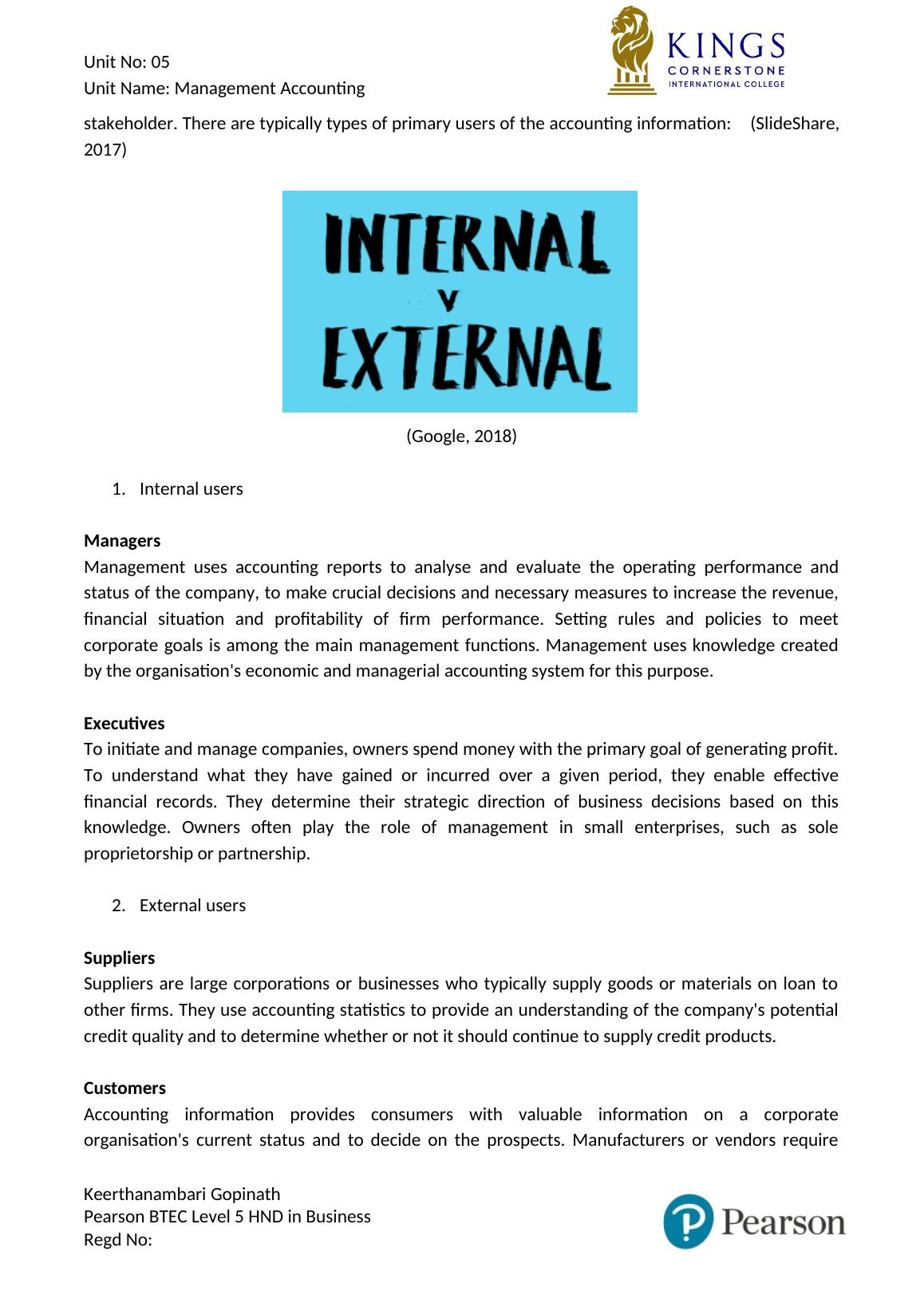
Unit No: 05
Unit Name: Management Accounting
confirmation at a certain point of production that products such as raw materials, parts, equipment
and service, etc will continue to be supported by the company in question. A reliable supply of
goods must be maintained by wholesalers and retailers. The continued availability of goods and
related products is of importance to end-users or end consumers.
Employees
Employees who may not have a hand in central organizational development are known for being
external accounting information users. They are involved in financial details because their present
and future are related to the success of the company or failure. Company growth and sustainability
guarantee job security, better salaries and benefits, job advancement and incentives for retirement.
Investors
Ownership is also segregated from management in the commercial type of organization. Investors
usually provide funding and the company is managed by management. Both existing and
prospective investors make use of the accounting details. This knowledge is used by big investors to
consider how management uses their funds and what the corporation's potential future success in
terms of profitability and growth. They determine, based on that data, whether to increase or
decrease company investment for the future. To determine whether or not a company's
management is acceptable for its investment needs, prospective investors use accounting
information.
Management Accounting System
There are different varieties of management accounting systems that a company can use to gather
and report financial and statistical data. Organizations use various accounting management systems
that enable them to efficiently implement development and production activities. Several causes,
such as manufacturing costs related to the goods manufactured and service offered, are taken into
account. There are certain principles that management accounting system follows which are
commonly noted to be also implemented in organizations:
Principles of Management Accounting:
Keerthanambari Gopinath
Pearson BTEC Level 5 HND in Business
Regd No:
Unit Name: Management Accounting
confirmation at a certain point of production that products such as raw materials, parts, equipment
and service, etc will continue to be supported by the company in question. A reliable supply of
goods must be maintained by wholesalers and retailers. The continued availability of goods and
related products is of importance to end-users or end consumers.
Employees
Employees who may not have a hand in central organizational development are known for being
external accounting information users. They are involved in financial details because their present
and future are related to the success of the company or failure. Company growth and sustainability
guarantee job security, better salaries and benefits, job advancement and incentives for retirement.
Investors
Ownership is also segregated from management in the commercial type of organization. Investors
usually provide funding and the company is managed by management. Both existing and
prospective investors make use of the accounting details. This knowledge is used by big investors to
consider how management uses their funds and what the corporation's potential future success in
terms of profitability and growth. They determine, based on that data, whether to increase or
decrease company investment for the future. To determine whether or not a company's
management is acceptable for its investment needs, prospective investors use accounting
information.
Management Accounting System
There are different varieties of management accounting systems that a company can use to gather
and report financial and statistical data. Organizations use various accounting management systems
that enable them to efficiently implement development and production activities. Several causes,
such as manufacturing costs related to the goods manufactured and service offered, are taken into
account. There are certain principles that management accounting system follows which are
commonly noted to be also implemented in organizations:
Principles of Management Accounting:
Keerthanambari Gopinath
Pearson BTEC Level 5 HND in Business
Regd No:
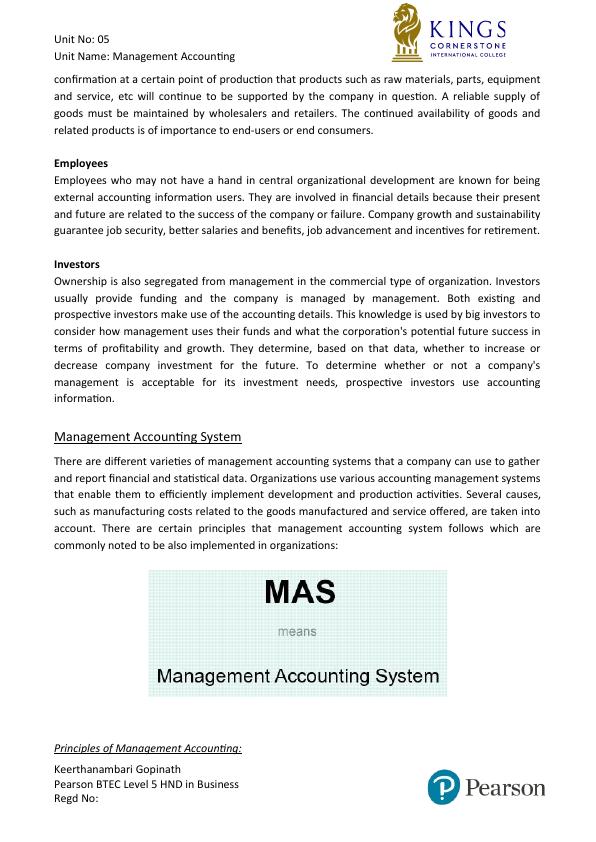
Unit No: 05
Unit Name: Management Accounting
Influence
Communication offers important knowledge. Communication signifies the beginning and conclusion
of accounting for management. It facilitates the decision-making process by presenting insightful
information at all levels of decision-making. It is easy to recognise, authorise, or change the effect
of decisions committed in one area of an organization on the other divisions.
Credibility
In making the decision-making process even more systematic, commitment and evaluation assist.
Trust and efficiency are enhanced by balancing near-term market interests against long-run value
for shareholders. Researchers of management accounting are considered to be ethical,
accountable, and mindful of the values, basic requirements of government, and interpersonal
responsibilities of the company.
Constructively striving to get input and being open to questions or negative input helps individuals
who have a personal investment in the overall efficiency of the company to be controlled. This
strengthens the company's integrity, prestige, and honesty and has a beneficial impact on the
improvement of procedures and authority.
Value
It estimates the effect on value. Management accounting ties the operations of the enterprise to its
central business model and involves an in-depth understanding of the wider economic and financial
environment. It includes analysing information along the course of competitive advantage,
calculating potential opportunities, and focusing on costs, expenditures, and the probability of
value creation prospects. Assessment of the situation brings specificity to evaluating management
decisions. Companies can make informed decisions about withdrawing or getting the benefit of
them by utilizing situation models to determine the effects of particular opportunities and
challenges.
Relevance
Management accounting reviews the strongest available tools for details related to the decision
being made, the decision-makers and the process of decision-making is applied. The most
important and valuable information for decision-making is established, collected, and structured for
assessment by coming to terms with the conditions of shareholders. This done through a balance
of:
Past, current, and future-dependent knowledge as well.
External and Internal Records.
All financial and non-financial data, also including social and environmental issues.
Keerthanambari Gopinath
Pearson BTEC Level 5 HND in Business
Regd No:
Unit Name: Management Accounting
Influence
Communication offers important knowledge. Communication signifies the beginning and conclusion
of accounting for management. It facilitates the decision-making process by presenting insightful
information at all levels of decision-making. It is easy to recognise, authorise, or change the effect
of decisions committed in one area of an organization on the other divisions.
Credibility
In making the decision-making process even more systematic, commitment and evaluation assist.
Trust and efficiency are enhanced by balancing near-term market interests against long-run value
for shareholders. Researchers of management accounting are considered to be ethical,
accountable, and mindful of the values, basic requirements of government, and interpersonal
responsibilities of the company.
Constructively striving to get input and being open to questions or negative input helps individuals
who have a personal investment in the overall efficiency of the company to be controlled. This
strengthens the company's integrity, prestige, and honesty and has a beneficial impact on the
improvement of procedures and authority.
Value
It estimates the effect on value. Management accounting ties the operations of the enterprise to its
central business model and involves an in-depth understanding of the wider economic and financial
environment. It includes analysing information along the course of competitive advantage,
calculating potential opportunities, and focusing on costs, expenditures, and the probability of
value creation prospects. Assessment of the situation brings specificity to evaluating management
decisions. Companies can make informed decisions about withdrawing or getting the benefit of
them by utilizing situation models to determine the effects of particular opportunities and
challenges.
Relevance
Management accounting reviews the strongest available tools for details related to the decision
being made, the decision-makers and the process of decision-making is applied. The most
important and valuable information for decision-making is established, collected, and structured for
assessment by coming to terms with the conditions of shareholders. This done through a balance
of:
Past, current, and future-dependent knowledge as well.
External and Internal Records.
All financial and non-financial data, also including social and environmental issues.
Keerthanambari Gopinath
Pearson BTEC Level 5 HND in Business
Regd No:
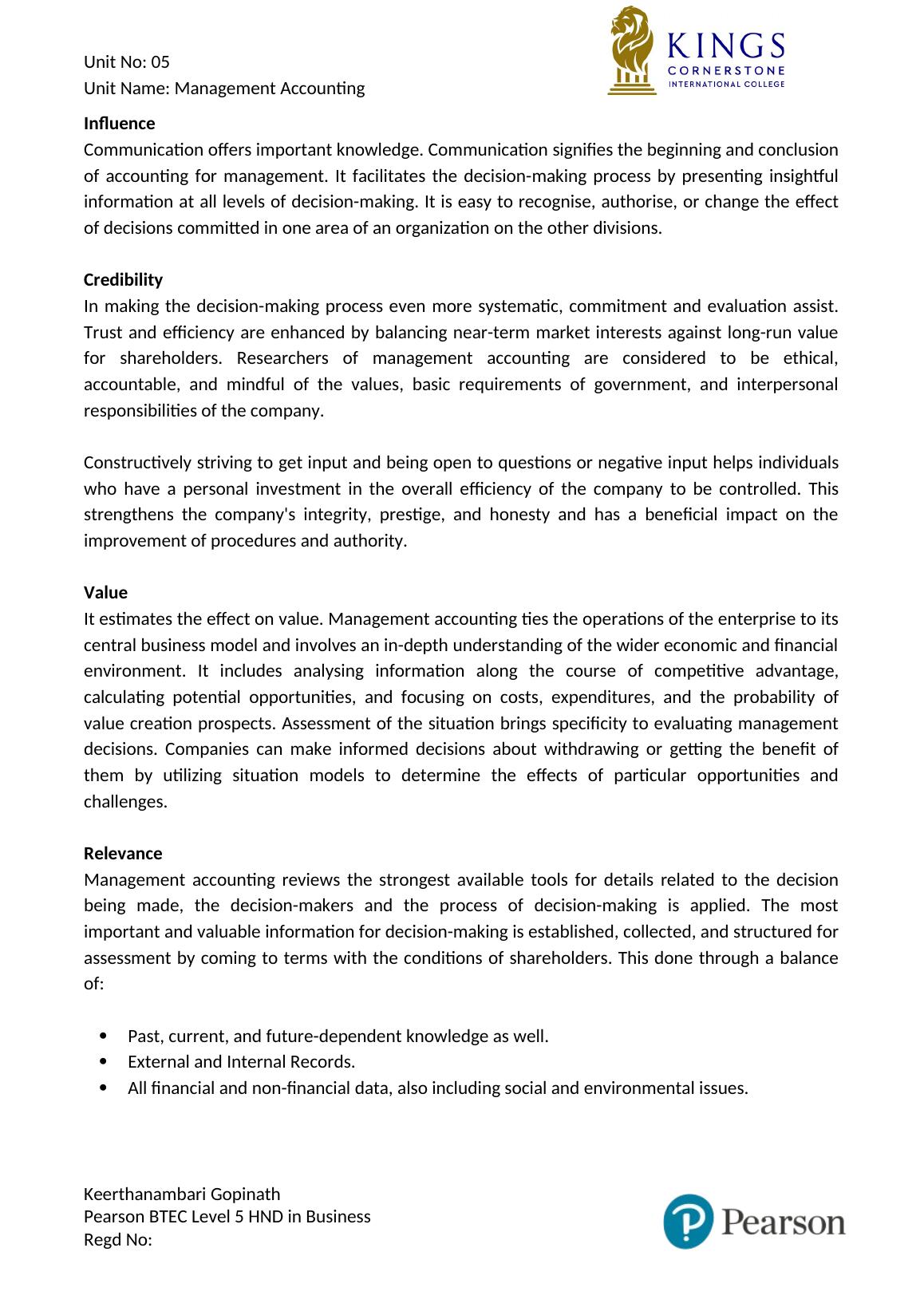
End of preview
Want to access all the pages? Upload your documents or become a member.
Related Documents
Business Planning: Budgeted Statement Profit & Loss, Budgeted and Actual Balance Sheetlg...
|15
|2359
|1
Activity #. Description. Predecessor(s). Duration(days)lg...
|8
|326
|49
purpose of business plan : marketing planlg...
|88
|11640
|49
Project Management Fundamentals: Building a Schoollg...
|16
|1531
|406
LO1 Demonstrate an Understanding of Management Accounting Systemslg...
|46
|15399
|896
Financial Analysis of a Factionary Companylg...
|21
|3118
|77
